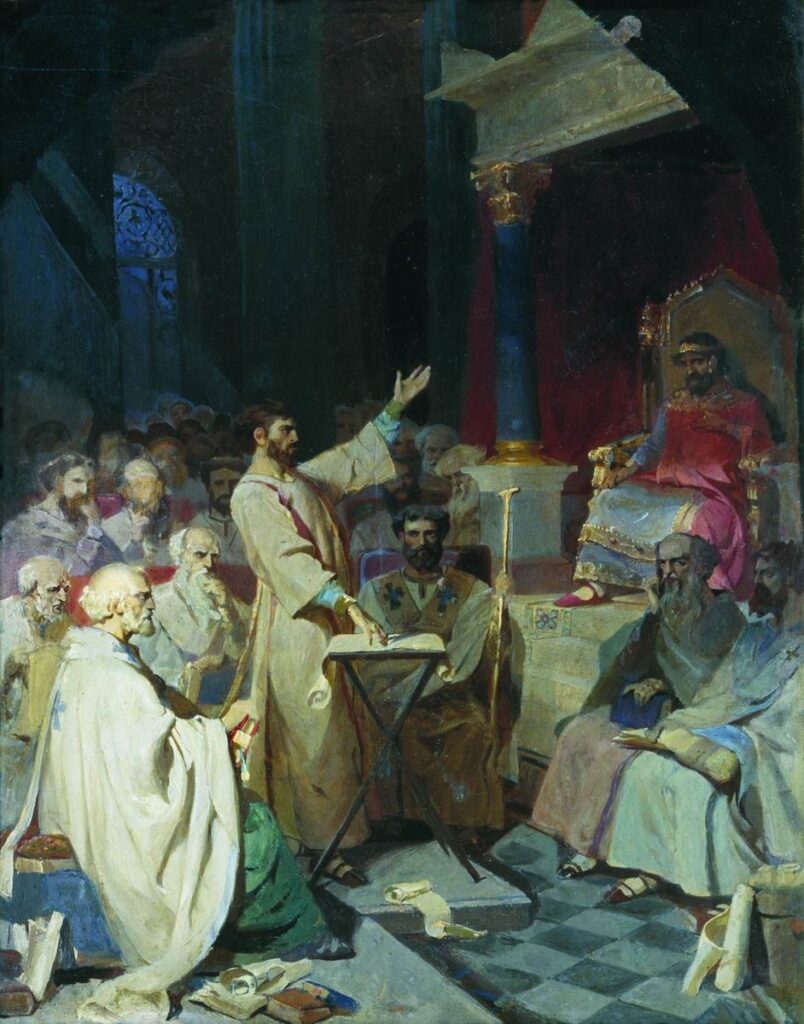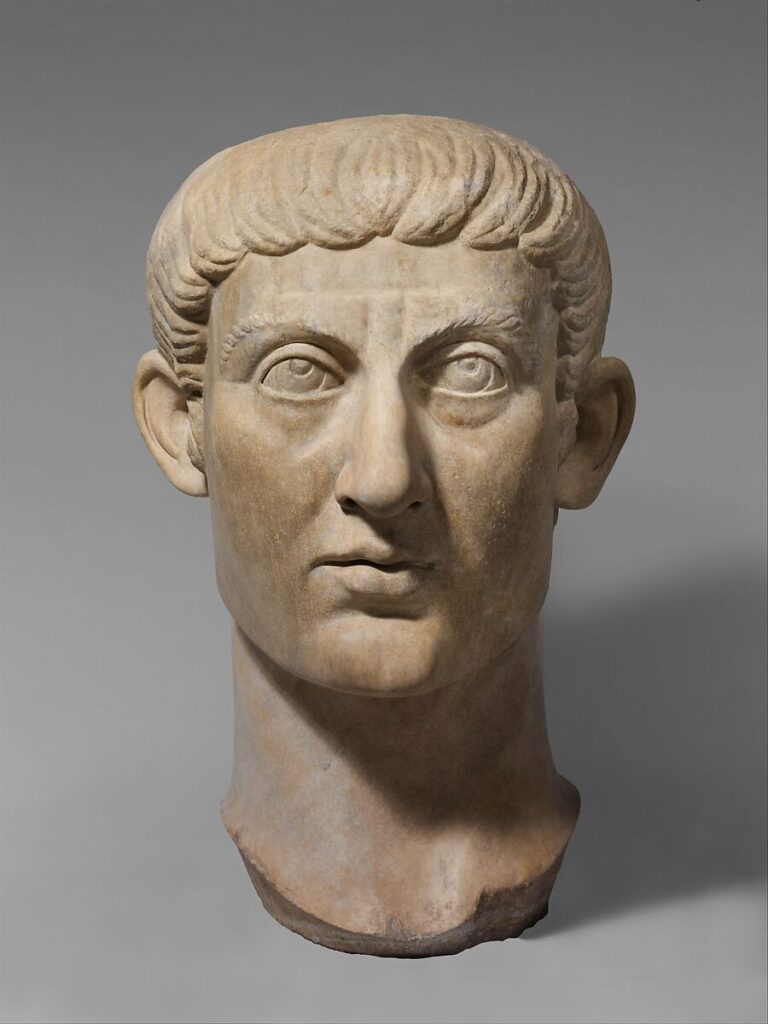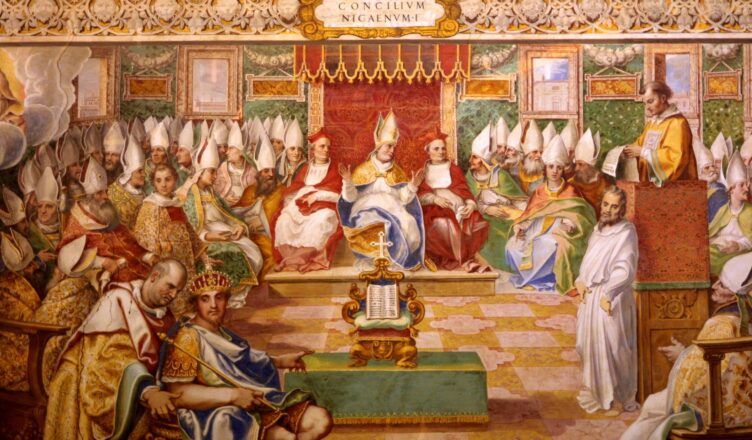
In 325, the Council of Nicaea met under the guiding hand of newly Christian Emperor Constantine I, and put together a Creed that would define what it is to be a Christian for centuries to come. The Nicene Creed established the doctrine of the trinity presented by the Alexandrian school—that the Father, the Son, and the Holy Spirit are equal parts of one singular divine being—as the Orthodox (or “correct”) school of thought, and in doing so defined all other beliefs as heretical. Arianism—the school of thought that believed God the Father was superior to Jesus, whom He created—as well as any other fringe beliefs, such as those held by the Gnostic sects, were no longer to be considered valid schools of Christian belief. This decision, as well as many of the other decisions made by the Council, still act as the foundation of Christian belief throughout the world.
In 2024, the Council met once again, as the students of History 342: Christians and Early Barbarians inhabited the roles of 4th century clergy and scholars to rehash the Early Medieval debate and establish our own Nicene Creed. Rather than relying on textbooks or PowerPoints, Professor Jesse Hysell encourages students to learn about the Council by becoming fully immersed in the nitty-gritty of its proceedings—from heated debates over the phrasing of Medieval scripture, to a covert assassination at the culmination of a successful power grab scheme. Each student is assigned a member of the Council who was present for the proceedings in 325 C.E., along with a list of that person’s goals, both personal and political. One student, donning the customary golden laurel diadem, oversees the proceedings as Emperor Constantine, granting boons and favors as they see fit.

Factions quickly form, the classroom fills with hushed conversations as plans are made, potential allies and enemies sussed out; eyes dart suspiciously to anyone brave enough to approach the Emperor’s swivel chair and kneel on the carpet. When the Council convenes on the second day, the debates begin. Should we even have a Creed? What all should be covered in it? Where in the scriptures does it say God and Jesus are of the same substance, or co-eternal? What scriptures should we even be consulting? Should we allow apostates back into the Church? Should we allow women into the clergy?
After several weeks of research, debate, and scheming, our new Nicene Creed was established. The 2024 version has some major differences, such as the removal of the declaration that Jesus was “eternally begotten of the Father” and that he was “begotten, not made,” a capitulation to the Arians that did not occur in the 4th century. As a final reflection on the assignment, students were tasked with writing a response to the Council’s decisions from the perspective of the council member they portrayed. As was the case with the historical council, opinions and interpretations varied wildly. Here are a few excerpts from members of the 2024 Council of Nicaea reflecting on their decisions.
Lilyonna Wazny—Bishop Eusebius of Caesarea
Dear Constantine, great ruler of Constantinople in the Byzantine Empire,
I wish you well. Although it may seem quite impossible, by the grace of our heavenly father, God, he has allowed me to pass this letter to you expressing my reflection of our council. I hope this will give you peace of mind after committing such a great sin and allowing one of your council members, Athanasius, to commit the most awful of crimes and MURDER me. I wish you good health so you will have time to ask God for forgiveness in this sin.
As I reflect on the deliberations of the council and all things discussed, I must say that I am quite glad about the outcome of the creed. I must also share with you that I am most grateful that no other Arians were martyred or excommunicated. I pray that they will see my death and be inspired to act in accordance with our previous discussions to help spread the true word of God… If I was allowed to stay on Earth with the council, I would hope to preach to the great people of Palestine, in accordance to our creed, “He ascended into heaven and is seated at the right hand of the Father,” in reference to Jesus’s crucifixion and death, that this is indeed proof that they are of different substance…tell our people that the Holy Spirit is what created our God, and from that he created mankind, then sent his son, Jesus Christ, to spread his word, and lead us in the correct direction. Please tell them to be on the lookout for the prophets, God has yet to share this information with me, but he does have plans to send yet another prophet to help guide everyone to heaven.
Evan Large—Bishop Meletius of Jerusalem
I know that some amongst my flock were worried about what we might decide during the council, but I can assure you all that this document is a treaty of unity. Only one bishop, a heretic and a murderer, refused to sign onto our creed, and he has been punished accordingly by our great Augustus Constantine. I believe that the church has been maintained and strengthened by this creed and the other decisions made at the council, and I hope that it has brought the church of our great Roman Empire together.
I will admit, at the start of the council there were some worrying signs that we would not be able to come together. The Alexandrian and Arian factions quickly calcified, and left me and a few other representatives trapped in the middle. However, those of us who did not subscribe to either faction quickly connected and agreed that it was in our best interest to stick together, even though we have very divergent beliefs about the nature of God and the future of the church. Unfortunately, in the early days of the council this did not mean much, as it was mostly devoted to the Arian and Alexandrian factions hurling unproductive insults at each other… I was brought to understand that what is important is not the precise doctrinary details of biblical interpretation, but a unified church. Every member of the council agrees on far more than we disagree… In the end, Arius had only minor language problems with the Alexandrians’ proposed creed, which I was more than happy to support in the name of unity.
Priscilla Santos—Bishop Augustin of Arelate
No celebration shall be held for our success, for the church and religion of Christianity shall be a downfall in the coming years… Apostate Christians who turned their back on Christianity will be allowed back after serving a period of penance, there will be a waiting period for priests prior to ordination, and worst of all… women will be allowed leadership positions in the church. This meeting was nothing more than watching children sit around a table and argue nonstop, and no common ground, and Emperor Constantine did nothing to stop such ridiculous arguments and speak like adults.
I tried to fight and fight for what was right for the church and for us, our people, the young generation, but I am afraid that that did not work in our favor… You may not like what I will say, but brothers we must follow the laws passed especially so we don’t face Emperor Constantine’s wrath again after all, he spared our lives and homes from when he first came here with his men. For now, we must work and find a way to work around these laws, if possible… This could be a change for the better, and although I very much don’t want to show it, I am curious what women can bring into the church and somewhere inside of me, I have high expectations and shall personally greet the newcomers with some form of gift. I pray to God above that, at the end we somehow achieve this peace between us all and if this was a mistake, may he forgive us all and let death come peacefully and forgive our sins. Amen.
Allauna Lotts—Bishop Eusebius of Nicomedia
A great victory has been achieved at the close of Emperor Constantine’s council at Nicaea! Bishops from across our Christian Empire have come together and, despite the disagreements and troublesome members, a glorious new Catholic Church has been defined… A Creed has been established detailing the truth as agreed upon by the council, signed by all in attendance but one – Athanasius, follower of Alexander, excommunicated and executed for denying his own faith… However, it pains me to give a grave announcement about Bishop Eusebius of Caesarea. On the very last day of the council, as we brought the Catholic Church to new heights, a jealous traitor to the Christian faith, a pretender, slew Eusebius. A lesser man might partake in the gossip that flooded the council halls that day about a particular dread member of Alexander’s inner circle who walks with assassins, but in accordance with the teachings of Christ and to avoid speaking ill of the dead, I will stay my hand.
The Creed agreed upon by the council is one that is to be celebrated… The wording of the Creed may be off-putting to the especially devout, as it is to those of us who fought for it, but know that it certainly looked much worse before we had something done about it! But with our excellent arguments and the favor of our Lord, the one true God above them all, the Creed we established at Nicaea is one that speaks our truth – of the Son Jesus Christ being of God, and the Holy Spirit being of God…of Jesus being a true God from the true God, of Jesus sitting at the right-hand side of the Father.
A massive victory was wrought at the council over the inclusion and role of women in the church. The followers of Alexander would have women take a minor role, subject to the same treatment as women outside our faith, a baseless and pagan tradition of servitude… Progress was made on the fate of apostates, the traitors of the persecution. While I recognize this is a controversial subject, I must reiterate my belief that those who turned away from our faith and preferred worshiping false gods and men to becoming a martyr of our Lord must face punishment for their sins. Many bishops agreed with me on this. Our final decision was that these apostates face a time of penance and reeducation before being allowed to rejoin us in the churches.
Lillyonna Wazny is majoring in history and philosophy. They wanted to take this class because of their interest in the time period, and the impact that religion has played on history as a whole. They also love how professor Hysell teaches their classes, and how engaging they make history through interactive games.
Evan Large is a freshman English major with a concentration in creative writing. He is taking HIST 342 due to a lifelong interest and passion for history
Priscilla Santos is a zoology major here at Ohio Wesleyan University. She decided to take Christians and Barbarians in Early Medieval Europe because she wanted to explore how Christianity influenced Medieval Europe in politics, economics, and education, and how it impacted what Europe is today. She also wanted to explore a different field and take something that was a bit different from her regular classes.
Allauna Lotts is a junior at Ohio Wesleyan University with a major in History, from the Hilliard area. She has a fascination with religious stories and mythology, and an interest in learning how everyday people lived their lives throughout historical events.
Featured Image: Council of Nicaea Fresco, 16th century, this image is in the public domain.
The First Council of Nicaea, Vasily Surikov, this image is in the public domain.
Bust of Emperor Constantine I, 325-370 C.E., this image is in the public domain, courtesy of the Metropolitan Museum of Art.





